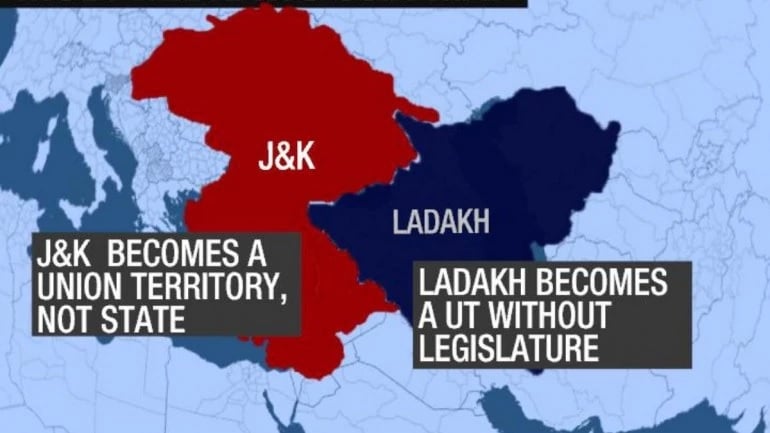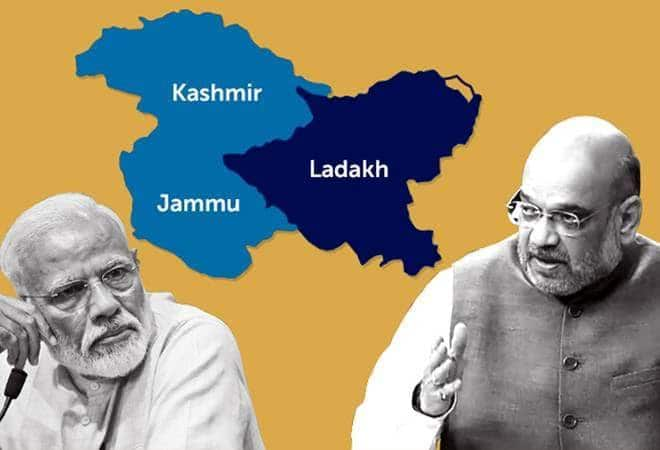Cancellation of Article 370 in Kashmir sees India leap in joy
I pinched myself twice after I heard Amit Shah talk about the cancellation of Article 370 and 35 A in Kashmir on national TV. Oh boy, I spoke to myself, this news is too good to be true.
In one masterstroke, the state of Jammu and Kashmir had ceased to exist, and Ladakh had become a Union Territory. The status of J&K, thanks to the cancellation of Article 370, was now no better than Delhi.

All of us were expecting that something big was going to happen in Kashmir. There were so many troops marching into that state that many of us thought India would wage a war upon Pakistan shortly.
Cancellation of Article 370- waiting for so long
All these years, I was waiting for the cancellation of Article 370 in this restive state. To me, it made no sense that while Rajasthan and Uttar Pradesh could welcome Tamils and Manipuris, there was no place for a non-Kashmiri in Jammu, Srinagar, Leh, and other J&K towns.
And this strange situation had to do with Jammu and Kashmir being a Muslim majority state. What an absolutely stupid arrangement it was! I pay tax to my government which is used by the Union government to make the lives of Kashmiris comfortable. And what do I get in return? Nearly nothing.
There were millions of common Indians like me who felt powerless and insulted. Didn’t we have a Constitution that said all Indians are equal and this country belongs to all?
Everyone knew that the correct solution to this problem was the cancellation of Article 370, but no political party had the guts to go that way. Finally, today Amit Shah, Home Minister of the Union Government, rose up in Rajya Sabha and clearly canceled this offensive law which discriminated Kashmir from the rest of India.
Laws that stopped the cancellation of Article 370
Basically, there were two laws in our Constitution that permit Kashmir to have a separate identity- Article 370 and Article 35 A.
Article 370 of our Constitution guaranteed the people of Jammu and Kashmir a special status. It said that no outsider (non-Kashmiri) could come to this state and acquire property here. Further, no woman from Jammu and Kashmir could inherit her property after she married any person from the rest of India.
This article also said that the Government of India could not make all the laws for Jammu and Kashmir. That privilege extended to just defense, foreign affairs, and finance. No government could make laws on marriage and divorce, land and property, agriculture, etc. for Jammu and Kashmir.
Even the Indian Criminal Procedure Code was not applicable to Jammu and Kashmir. That state had a separate procedure for handling criminal complaints called Ranbir Penal Code. In short, Jammu and Kashmir was living in lovely isolation created by our Indian Constitution.
But who decided whether a person belonged to this state or not? Was there any special law that laid down any procedure for identifying a Kashmiri and a non- Kashmiri?
Yes, there was indeed a law- Article 55 A. This Article defined who could be a resident of J&K and who could be not.
The Root of the problem
Article 370 was forced down the throats of millions of Indians by Sheikh Abdullah and Jawaharlal Nehru.
You would remember that after the British vacated India, Maharaja Hari Singh decided to merge his kingdom into India. This decision was not an automatic one but he was forced to side with India because Pakistan-backed jihadis were threatening him and his kingdom.
The king was forced to call India for help when he saw those jihadis had overrun Muzaffarabad, Poonch and were on the way to Srinagar.
Seeing the danger, the Raja begged India to rescue him and his state. Indian troops came over to Kashmir and once India recaptured Poonch and Baramula, the king had no option other than merging his kingdom into India.
The villain of the piece
But the merging of Kashmir into India came with a terrible price. Sheikh Abdulla, the then prime minister of the state, persuaded Jawaharlal Nehru to sign a document that gave a special identity to Kashmir. This document also called Nehru- Abdulla accord, laid the foundation of Article 370 and was signed in 1950.
Actually, Sardar Patel, the first Home Minister of India, had objected to Article 370 as he felt it would be against the spirit of the Indian Constitution. This article, he also felt, was against the wishes of millions of Indians who paid tax for the upkeep of Kashmir but had no role in its administration. They were supposed to defend that state and lay down their lives but weren’t expected to buy land and property in Jammu and Kashmir.
As long as Patel was alive, he opposed the special status of Kashmir. But when Patel died, there was no opposition to Nehru and his friend, Sheikh Abdulla. And this is how Article 370 came into being.
Sheer blackmail
There was another reason why this special provision came into being.
Right after Maharaja Hari Singh merged his kingdom into India, the then Prime Minister of Kashmir started dreaming about ruling over Kashmir. He wanted this state to have a special position in the world; he wanted J&K to be autonomous with nearly all the powers of an independent country.
To achieve his ambition, Abdulla did all that was possible. He even appealed to Britain, the United States, and the United Nations to guarantee the autonomy of Kashmir. The situation was indeed quite alarming for a newly independent India.
Now let’s walk back to October 1947. India had just then become independent and Sardar Patel was working very hard to sew the Indian Union together.
In October of the same year, Pakistan attacked Kashmir and came within a striking distance of Srinagar. There was a real risk of Kashmir getting overrun by the Pakis. Thanks to Brigadier Rajendra Singh and the Indian forces, a large part of Jammu and Kashmir was saved from these attackers and this is how we retained this state.
This event should have taught Nehru a vital lesson. He should have ordered the Indian Army to cross the present Line of Actual Control and take back Pakistan Occupied Kashmir and Baltistan. Instead, Nehru appealed to the UN to ask Pakistan to vacate the occupied Kashmiri territories and this is how the internationalization of the Kashmir issue began.
In 1950, when Abdulla began asking for a separate status for Kashmir, Nehru became worried. Perhaps he thought that the best way to keep Sheikh Abdulla was to keep him happy. Nehru had already allowed the United Nations to meddle in Indian affairs and was now worried that Abdulla would complicate matters even more. The best way, Nehru figured out, was to accept most of Abdulla’s demands. And that is how Article 370 came about.
A twist in the tale
You would be amazed to know that at the time of signing this document, Abdulla wanted Article 370 to be a permanent feature of the Constitution. He wanted an iron-clad guarantee that no future government would cancel this article. However, Nehru refused and persuaded Abdulla to accept that 370 was a temporary feature.
But there was a catch in the whole Article 370 arrangement.
Even though Article 370 was temporary in nature, it could be canceled only by the Constituent Assembly of Jammu and Kashmir. So how did the Union Government remove this provision?
The Government brought forward a Presidential order to remove this article. And it was the State Governor who recommended that 370 be canceled. But how could the Governor recommend such an action when there is no State Constituent Assembly? Well, here again, the Presidential order comes into play. When there is no state government in place, the Governor can make all the necessary recommendations including the cancellation of Article 370.
What next after the cancellation of Article 370?
The road ahead is not so smooth.
No doubt, the rest of Indians can very well go and settle in Kashmir and Jammu and even buy property, but this isn’t going to be very easy.
In particular, some Kashmiri Muslims would do whatever they can to stop the rest of Indians coming over to the Valley. Who knows, there might be an increased insurgency in Kashmir in the days to come? Next year, some locals may openly attack the Amarnath yatris.
In Jammu, things would be easier. Since this area has a large Hindu majority, there shouldn’t be any problem in outsiders coming and settling here. The same goes in Ladakh too but very few people would like to go and live in Leh and Drass.
The most important change this cancellation has brought is about the Center-Kashmir relations. From today, the Kashmir valley will no longer be a full-fledged state; rather, it will be considered much like Delhi, Chandigarh, and Pondicherry. The state police would now be under the control of the Union Government, just like in Delhi.
I am not sure whether all land in the state too would be owned by the Center but it would make sense if it would. Else, all those state employees in the land department would stop all the various land deals involving outsiders.
Investment is another area. Now thanks to this cancellation of Article 370, many Indian and foreign industrialists would think of setting factories and plants in Jammu and Kashmir. I think the tourism sector should do better now in this state. But all these investment-related activities would be useless unless Kashmir becomes a safer place to live and work in.
What about the Abdullah and Mehbooba Mufti?
Haha, now these out of work politicians should start thinking of becoming the Chief Minister of the Union Territory of Jammu and Kashmir. Their status is now very similar to Arvind Kejriwal. These people can make laws but ultimately, the Abdullah and the Muftis would be answerable to the Governor of the state.
Last word
I hope the next step would be to encourage Kashmiri Pandits to return to their homeland and start leading normal lives. Now that there is no Article 370, our Kashmiri Pandit brothers and sisters should now develop meaningful business partnerships with non-Kashmiris and restart their lives.

